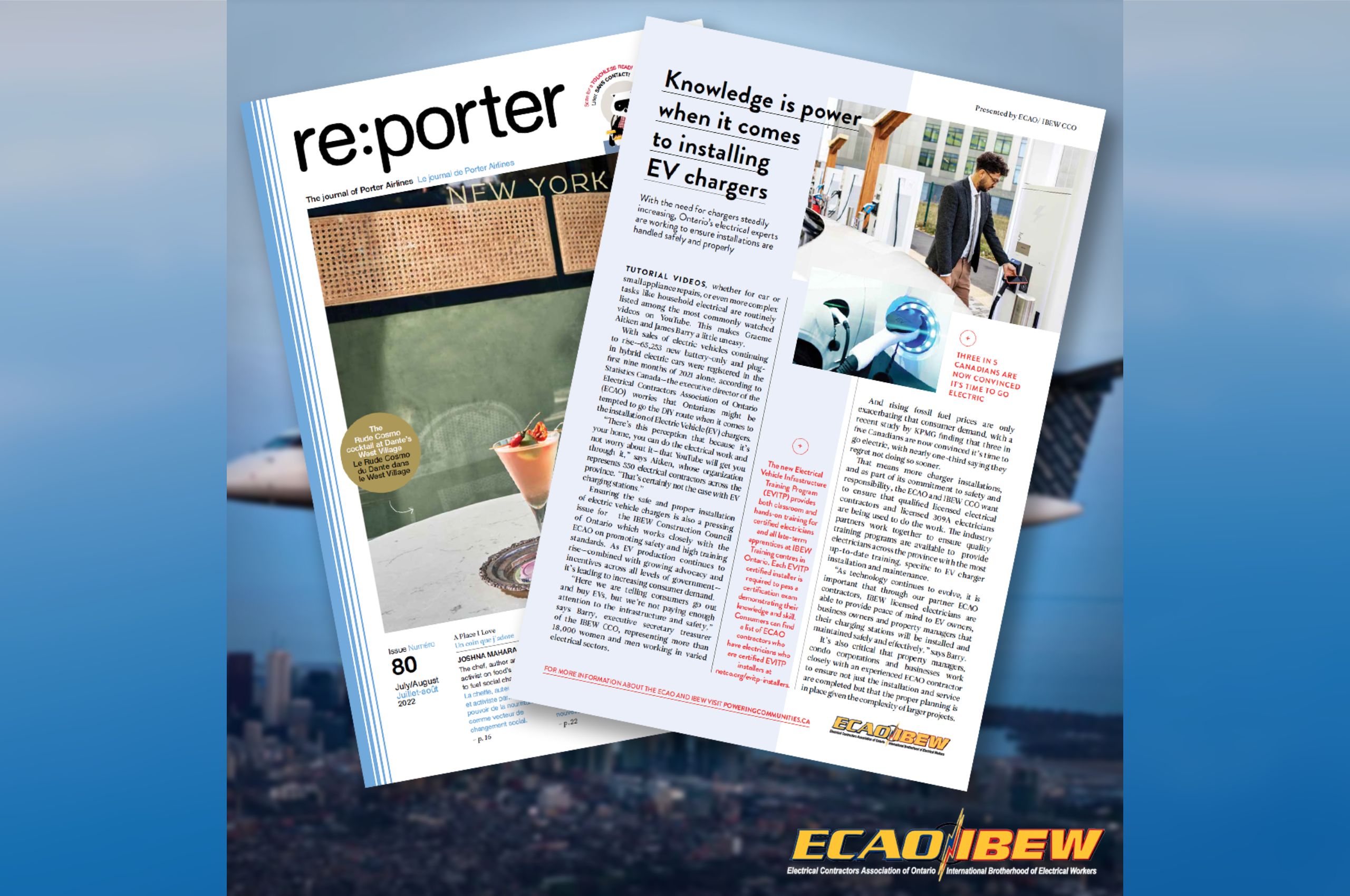This article, “Knowledge Is Power When It Comes to Installing EV Chargers,” was featured in the July/August 2022 edition of re:porter magazine, the journal of Porter Airlines.
Knowledge Is Power When It Comes to Installing EV Chargers

With the need for chargers steadily increasing, Ontario’s electrical experts are working to ensure installations are handled safely and properly.
Tutorial videos, whether for car or small appliance repairs or even more complex tasks like household electrical, are routinely listed among the most commonly watched videos on YouTube. This makes Graeme Aitken and James Barry a little uneasy.
With sales of electric vehicles continuing to rise—65,253 new battery-only and plugin hybrid electric cars were registered in the first nine months of 2021 alone, according to Statistics Canada—the Executive Director of the Electrical Contractors Association of Ontario (ECAO) worries that Ontarians might be tempted to go the DIY route when it comes to the installation of Electric Vehicle (EV) chargers.
“There’s this perception that because it’s your home, you can do the electrical work and not worry about it—that YouTube will get you through it,” says Aitken, whose organization represents 550 electrical contractors across the province. “That’s certainly not the case with EV charging stations.”
Ensuring the safe and proper installation of electric vehicle chargers is also a pressing issue for the IBEW Construction Council of Ontario, which works closely with the ECAO on promoting safety and high training standards. As EV production continues to rise—combined with growing advocacy and incentives across all levels of government—it’s leading to increasing consumer demand.
“Here we are telling consumers ‘go out and buy EVs,’ but we’re not paying enough attention to the infrastructure and safety,” says Barry, Executive SecretaryTreasurer of the IBEW CCO, representing more than 18,000 women and men working in varied electrical sectors.
And rising fossil fuel prices are only exacerbating that consumer demand, with a recent study by KPMG finding that three in five Canadians are now convinced it’s time to go electric, with nearly one-third saying they regret not doing so sooner.
That means more charger installations, and as part of its commitment to safety and responsibility, the ECAO and IBEW CCO want to ensure that qualified licensed electrical contractors and licensed 309A electricians are being used to do the work. The industry partners work together to ensure quality training programs are available to provide electricians across the province with the most up-to-date training, specific to EV charger installation and maintenance.
“As technology continues to evolve, it is important that through our partner ECAO contractors, IBEW licensed electricians are able to provide peace of mind to EV owners, business owners and property managers that their charging stations will be installed and maintained safely and effectively,” says Barry.
It’s also critical that property managers, condo corporations and businesses work closely with an experienced ECAO contractor to ensure not just the installation and service are completed but that the proper planning is in place given the complexity of larger projects.
The new Electrical Vehicle Infrastructure Training Program (EVITP) provides both classroom and hands-on training for certified electricians and all late-term apprentices at IBEW Training centres in Ontario. Each EVITP-certified installer is required to pass a certification exam demonstrating their knowledge and skill.
Related Reading:
- Innovative Approaches to Harnessing Power Will Transform Businesses
- Planning Key for Electric Car Charging Stations
- EV Charging: Understanding Installation Complexity
Consumers can find a list of ECAO contractors who have electricians who are certified EVITP installers at netco.org/evitp-installers.